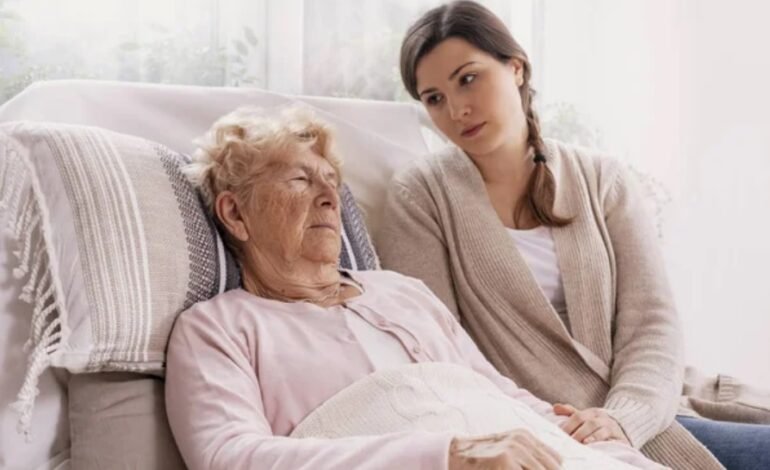10 Signs It’s Time to Consider Live-In Care for Your Loved One

As our loved ones age, managing daily activities can become more challenging. While family members often provide support, there may come a time when professional help is needed. Live-in care is a valuable option, as it allows your loved one to stay in their home while receiving the assistance they need. Recognising the signs that it’s time to consider live-in care is essential for ensuring their safety and well-being.
What is Live-In Care?
Live-in care means having a carer stay home with your loved one, providing around-the-clock support. This type of care is adapted to meet the specific needs of the individual, from help with personal care to companionship and medical assistance. The aim of live-in care is to help the person live as independently as possible while ensuring they are safe and comfortable.
1. Increased Frailty
One of the first signs that live-in care may be needed is increased frailty. As people age, they become weaker, making it difficult to stand, walk, or move around without help. If your loved one often falls, has difficulty moving around, or struggles with climbing stairs, it might be time to think about live-in care. This level of care ensures that someone is always there to help with movement, reducing the risk of injury.
Increased frailty can also lead to a fear of falling, which may cause your loved one to limit their activities. This fear can lead to further physical deterioration because of decreased activity and exercise. A live-in carer can provide the reassurance and support needed to keep your loved one active and help them maintain their physical health.
2. Difficulty with Personal Care
Personal hygiene is essential to daily life, but it can become a challenge for some elderly individuals. If your loved one is having trouble bathing, dressing, or grooming, it might indicate they need extra help. A live-in carer can assist with these tasks, enabling your loved one to maintain their dignity and health.
In addition to primary personal care, live-in carers can help with more specialised needs, such as managing incontinence or assisting with mobility aids. This kind of support can greatly enhance your loved one’s quality of life, enabling them to maintain their daily routines with increased comfort and ease.
3. Unintended Weight Loss or Poor Nutrition
If your loved one is unintentionally losing weight or not eating properly, it might indicate difficulties in meal preparation or dietary management. Inadequate nutrition can result in various health issues, underscoring the importance of addressing this problem promptly. Live-in care ensures that your loved one consistently receives nutritious meals, which helps preserve their strength and health.
A live-in carer can also keep an eye on your loved one’s dietary habits and make sure they receive the necessary nutrients. This is particularly vital for individuals with dietary restrictions or specific health-related dietary needs. The carer can cook meals that adhere to these requirements, helping your loved one maintain a healthy diet.
4. Memory Loss and Confusion
Memory loss and confusion are common issues as people age, but they can also pose significant risks to safety. If your loved one needs to remember to turn off appliances, gets lost in familiar places, or becomes disoriented about time and place, live-in care may be necessary. A live-in carer can provide the supervision needed to keep them safe while helping them manage these challenges.
Memory loss can also lead to missed appointments, forgotten medications, and other lapses in daily routines. A live-in carer can assist your loved one in staying organised and maintaining a schedule, ensuring that pivotal tasks are completed promptly. This support can reduce the stress and anxiety associated with memory problems, allowing your loved one to feel more secure daily.
5. Difficulty Managing Medications
Taking medications correctly is vital for managing health conditions. Still, it can be difficult for some elderly individuals to keep track of their prescriptions. Suppose your loved one is forgetting to take their medication, taking incorrect dosages, or mixing up their pills. In that case, it’s a clear sign that they need assistance. A live-in carer can ensure that medications are taken as prescribed, preventing potential health problems.
Medication management is a critical aspect of live-in care. Carers can organise medications, set reminders, and even administer medications if necessary. This level of support ensures that your loved one receives the correct treatment for their health conditions, reducing the risk of complications and hospitalisations.
6. Difficulty Managing Finances and Bills
As cognitive abilities decline, managing finances and paying bills can become overwhelming. Suppose your loved one is missing payments, struggling to understand financial documents, or having trouble managing their money. In that case, live-in care can provide the necessary support. A carer can assist with organising and paying bills, ensuring that financial matters are handled correctly.
Financial management is often one of the first areas where cognitive decline becomes apparent. A live-in carer can assist your loved one in managing their finances, ensuring that payments are made on time and preventing any financial oversights. This support can also protect your loved one from potential financial exploitation, ensuring their assets are secure.
7. Increased Isolation and Loneliness
Social isolation and loneliness can seriously impact an elderly person’s mental and emotional health. Suppose your loved one is withdrawing from social activities, avoiding contact with friends and family, or spending most of their time alone. In that case, it may be time to consider live-in care. A carer can provide companionship and encourage social interaction, helping reduce loneliness. The National Council on Aging emphasises the importance of social engagement for maintaining overall well-being.
Besides offering companionship, live-in carers also assist your loved one in maintaining connections with their community. This might include accompanying them to social events, arranging visits with friends and family, or helping them engage in hobbies and activities they enjoy. This social support can significantly enhance your loved one’s quality of life, reducing the risk of depression and other mental health issues.
8. Mood Swings or Changes in Behaviour
Rapid shifts in mood or behaviour may indicate that your loved one is experiencing mental health challenges. If they are becoming more irritable, anxious, or depressed, it could indicate that they need more support. Live-in care provides consistent emotional support, helping to manage these changes and improve their quality of life.
Mood swings and behavioural changes can be distressing for both your loved one and their family. A live-in carer can provide the reassurance and stability needed to steer these challenges. By offering a listening ear and a calm presence, the carer can help your loved one feel more at ease, reducing the intensity and frequency of mood swings.
9. Decline in Home Cleanliness and Organisation
A decline in the cleanliness and organisation of your loved one’s home can indicate that they struggle to manage daily tasks. If their home is becoming cluttered, dirty, or disorganised, it may be time to consider live-in care. A carer can help with household chores, ensuring the living environment remains safe and comfortable.
A tidy and well-organised home is key for ensuring a safe and healthy living space. Live-in carers can assist with cleaning, laundry, and home maintenance, helping create a space where your loved one feels comfortable and secure. This support can also prevent accidents and health hazards, ensuring your loved one can continue living independently.
10. Safety Concerns in the Home
Safety should always be a top priority, but it can become a concern if your loved one is experiencing accidents or close calls at home. These incidents can be dangerous, whether it’s kitchen mishaps, leaving the stove on, or forgetting to lock doors. Live-in care provides constant supervision, ensuring that safety measures are in place and followed.
In addition to monitoring safety, live-in carers can make necessary adjustments to the home to prevent accidents. This might include installing grab bars, removing trip hazards, or ensuring clear and well-lit pathways. By fostering a safer environment, carers enable your loved ones to preserve their independence while reducing the risk of injury.

What to Do Next
Recognising these signs is the initial step in safeguarding your loved ones and ensuring they receive the care they need. If you notice any of these indicators, having an open and honest conversation with your family about the next steps is essential. Consulting with a healthcare professional or a care coordinator can help you evaluate the situation and decide the best course of action.
For more resources on caregiving, the Family Caregiver Alliance offers valuable information and support for families to guide these decisions.
Summary
Deciding to bring live-in care for your loved one is a significant decision. Still, it can significantly improve their quality of life and provide peace of mind for your family. Companies like Agincare offer caring and professional live-in care services, guaranteeing that your loved one gets the support they need while remaining in their home.
If you or your loved one is experiencing any of these signs, consider live-in care to maintain their independence and well-being.












